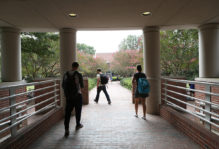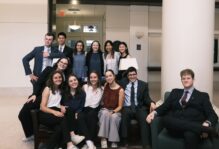How two student researchers innovated when data couldn’t lead the way
By Anna Raymond ’23 and Kayla Seggelke ’23
Learning to conduct self-guided scientific research as an undergraduate student is difficult enough, and throwing a pandemic into the mix created a whole slew of learning barriers we didn’t even know existed! Fortunately, we had the support of the Global Research Institute and the Alan B. Miller Entrepreneurship Center to help us through this process, from beginning to end.
Initially, we had set out to correlate climate change-related flooding and cholera cases in eastern Asia. Since both of us are majoring in computer-related fields, we wanted to conduct research to bridge these areas. Ultimately, we found a gap in the literature at the intersection of traditional epidemiology and modern issues, such as climate change. After our COLL 100 professor, Tyler Frazier, introduced the Shark Tank event to the class, we felt that it was the perfect opportunity to explore this new idea. Eventually, Professor Frazier became one of our mentors, guiding us in the use of spatial data. We were also lucky enough to have Professor Dana Willner involved as a mentor, bringing expertise in the biological aspects of computer science.
As we began working through our rudimentary idea, we were met with numerous hurdles. Ultimately, we decided to transform these difficulties into opportunities to expand the scope of our research. In the era of information, we figured that the data we needed would be readily accessible; after all, what sort of data is not collected and analyzed in this day and age? That is true—most of the data we needed did exist, but it was locally governed by small health organizations based in separate countries and only accessible via email. During a pandemic, health organizations have much more important things to be doing than handing out data to two undergraduate researchers half a world away.
The only data we could find were aggregate data counts with a year attached, but we needed geographic data with smaller time intervals. This remarkable lack of data accessibility, and the ideas of our mentors, helped us to refocus our project to fill the gap in the information. We landed on creating a model that could disaggregate disease counts for cholera into estimated locations of where they happened in a country. This model could then be used for other research projects encountering the same data accessibility struggles that we did.
While this was far from the only challenge we encountered in our still-progressing project, we also gained invaluable experience that will help us as we move into our career fields, such as learning R Studio to process Demographic and Health Services data sets or building a website so that we could present our final project. While these specific skills may typically be taught in a classroom setting and may not directly apply to my or my partner’s undetermined career fields, the experience of teaching these to ourselves will help us in the future. Going above and beyond is a hallmark of the entrepreneurial and researching spirit.
Our research partnership with the Global Research Institute and the Entrepreneurship Center at the Mason School of Business has exposed us to a plethora of skills, connections, and mindsets that will serve us well as we move forward with this project and with our education. For example, this project was conceived in a world before coronavirus, and actualized in a world with it. As we navigated the unprecedented era of virtual learning and lockdowns, our final product became more relevant to the world and to ourselves. All major takeaways from this experience—such as the required resilience in the face of data inaccessibility, the nuances behind virtual communication, and the importance of self motivation—will stick with us post-project and post-pandemic.
Comments are currently closed. Comments are closed on all posts older than one year, and for those in our archive.




What an amazing project! Not only are two undergraduate women gracefully overcoming these unprecedented boundaries in global research, but two underclassmen who began this as freshmen! Go Tribe!!